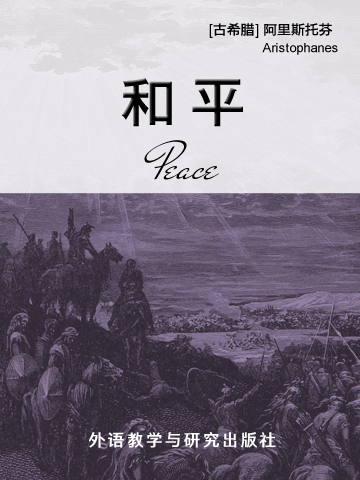FIRST SERVANT
Quick, quick, bring the dung-beetle his cake.
SECOND SERVANT
There it is. Give it to him, and may it kill him! And may he never eat a better.
FIRST SERVANT
Now give him this other one kneaded up with ass's dung.
SECOND SERVANT
There! I've done that too. And where's what you gave him just now? Surely he can't have devoured it yet!
FIRST SERVANT
Indeed he has; he snatched it, rolled it between his feet and bolted it. Come, hurry up, knead up a lot and knead them stiffly.
SECOND SERVANT
Oh, scavengers, help me in the name of the gods, if you do not wish to see me fall down choked.
FIRST SERVANT
Come, come, another made from the stool of a fairy's favourite. That will be to the beetle's taste; he likes it well ground.
SECOND SERVANT
There! I am free at least from suspicion; none will accuse me of tasting what I mix.
FIRST SERVANT
Faugh! come, now another! keep on mixing with all your might.
SECOND SERVANT
By god, no. I can stand this awful cesspool stench no longer.
FIRST SERVANT
I shall bring you the whole ill-smelling gear.
SECOND SERVANT
Pitch it down the sewer sooner, and yourself with it. (To the AUDIENCE) Maybe, one of you can tell me where I can buy a stopped-up nose, for there is no work more disgusting than to mix food for a dung-beetle and to carry it to him. A pig or a dog will at least pounce upon our excrement without more ado, but this foul wretch affects the disdainful, the spoilt mistress, and won't eat unless I offer him a cake that has been kneaded for an entire day.... But let us open the door a bit ajar without his seeing it. Has he done eating? Come, pluck up courage, cram yourself till you burst! The cursed creature! It wallows in its food! It grips it between its claws like a wrestler clutching his opponent, and with head and feet together rolls up its paste like a rope-maker twisting a hawser. What an indecent, stinking, gluttonous beast! I don't know what angry god let this monster loose upon us, but of a certainty it was neither Aphrodite nor the Graces.
这也是古希腊的一部喜剧,在演出不久之后,就在酒神节上获得了二等奖。讲述的是一个偶然的机会,特里伽俄斯结束了伯罗奔尼撒战争,从而引发一系列事件的故事。
Aristophanes' Peace was performed at the City Dionysia in Athens in 421 BC as a decade-long war with Sparta seemed finally to be drawing to an end, and is one of only eleven extant plays by the greatest Old Comic poet. Olson's edition of the play, which replaces Platnauer's of 1969, is based on a complete new collation of the manuscripts, many of which have never been adequately reported before. The extensive commentary explores matters of all sorts, but it focuses in particular on the realities of day-to-day life in classical Athens and also examines the practical problems of staging. The substantial introduction includes essays on Aristophanes' early career, the politics of the Greek world in the late 420s, and the poet's theology.
- PEACE
- 书评 写书评
- 笔记
-
书评加载中...























 京公网安备 11010802032529号
京公网安备 11010802032529号
笔记加载中...